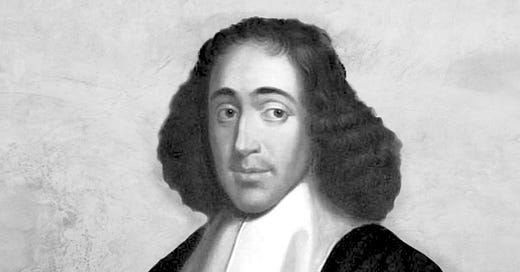Quite recently, Elon Musk, the (in)famous CEO of Tesla, SpaceX and StarLink appeared on a podcast of the satirical newsite the Babylon Bee (a Christian/evangelical version of The Union) to discuss a large variety of topics regarding SpaceX, Tesla and extraterrestrial colonization among other things. Sometime during the podcast Elon Musk was asked whether he believed in God. After a brief moment of silence and consideration he answered: “I believe what Einstein would say, I believe in the God of Spinoza”. A curious answer to a difficult question. The God of Spinoza, what exactly is it that Elon Musk was referring to? Let us have a look.
Benedictus de Spinoza (1632 - 1677) is one of the great philosophers, he received tremendous acclaim in the 20th and 21st century and is widely recognized for his original thoughts and rather unique metaphysical system. His reputation, to this day, remains very high.
Spinoza lived in the Netherlands during the Dutch Golden Age. He had a difficult life, for his ideas, at that particular time and historical context, weren’t widely accepted and appreciated. Spinoza wrote things that weren’t reconcilable with the official monotheistic doctrine of that time. He rejected the abrahamic-religious view of God being a “personal God”, rejected the classical view of the soul and didn’t believe in eternal life after death. Subsequently he was branded a disbeliever by his community and society at large. He was excommunicated from the Jewish community and was ostracized to a substantial degree. He lived his life in relative solitude. Throughout his life, however short lived, he wrote several influential books. One of his greatest works, his book “Ethics” entails a complete metaphysical system about the whole of reality. In the very first chapter of “Ethics” Spinoza gives his view on the structure of reality: His ontology and cosmology. Questions such as “what exists?”, “what is reality made of?” and “was reality caused?” are all addressed in the first chapter which was fittingly named “concerning God.”
The God of Spinoza, substance monism
Spinoza wrote his book “Ethics” in Latin and used the terms “God” and “Nature” interchangeably. This is important to understand because Spinoza’s definition of God differed fundamentally from the definition of God monotheistic Abrahamic religions adhered to. (The term “The Universe”, when defined as “everything there is” would probably also be fittingly to Spinoza).
Spinoza was quite fond of René Descartes (1596 - 1650) and refers to him regularly. Spinoza accepted Descartes ontological proof of God’s existence, but he opposed Descartes mind-body dualism. He valued Descartes use of “substance,” but took it in a different direction. Where Descartes believed there is an infinite substance, namely: God, that creates finite substances (such as the material world and the thinking world), Spinoza believed there is only one infinite perfect substance: God/Nature/The Universe. To Spinoza “substance” is everything that there is, and can best be understood as something that needs nothing else in order to exist. Unlike Descartes, Spinoza was a monist and not a dualist. But How did Spinoza arrive at the idea of an infinite perfect substance?
Spinoza argued that if God is truly infinite, there can be nothing outside of him. For if there would be something outside of God, something to possibly limit God, God would be finite. He therefore concluded God has to be coextensive with The Universe. Spinoza didn’t believe “everything there is” was caused by a transcendental perfect uncaused being, but that instead, God/Nature/ The Universe/ “everything there is” was self-caused. For him the essence of substance is existence. Nothing created substance, it is simply here through the necessity of its own nature. In other words: The essence of The Universe is simply to be. Unsurprisingly Spinoza can rightfully be seen as a pantheist or even a panentheist.
God is the cause of all things, which are in him - Spinoza
Another argumentative route Spinoza took to come to the aforementioned conclusion is the following: Since God is a perfect infinite substance (as we’ve established, a substance doesn’t depend on anything else by definition) and since it is apparent that everything in the universe is causally related to something else, except, so Spinoza argued, for the universe itself. He reasoned: The Universe is “everything that is”, and there cannot be a cause of “everything there is” for there is nothing outside of “everything there is”. Therefore The Universe and God must be one. Everything must be one substance, one infinite perfect substance.
This substance monism allowed Spinoza to easily bypass certain problems inherent to Descartes philosophy. Where Descartes had trouble explaining how mind and body (two different substances according to Descartes) interacted with each other, to Spinoza these were merely two different modes of the same substance. All things considered it’s safe to say the God of Spinoza is a pan(en)theistic one.


